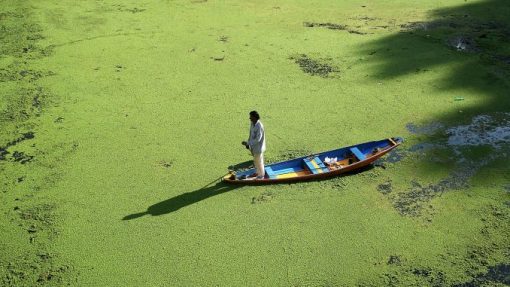
Srinagar: The fate of thousands of families living in and around Srinagar’s tourist hotspot, the Dal Lake, hangs in balance, as the Union Territory administration under the Central government rekindles its plan to relocate them for securing the lake’s "health and beauty."
For people living inside or within 200 metres of the lake’s catchment, even the construction of a toilet is considered a "violation" of rules set by the Lakes and Water Development Authority (LAWDA).
Dal Lake dwellers are often accused of encroachment and ruining the lake’s beauty and health in the absence of proper lake conservation plans and adequate sewage treatment plants.
LAWDA’s enforcement wing, in its latest statement, said it carried out a demolition drive at Lashkari Mohalla, Northen Foreshore Road, Ishber and Abi-Karpora areas on Wednesday. The agency claimed that during the drive, it demolished a tin shed, a tin walling and the second storey of a house.
For years, many people living in and around Dal Lake in Srinagar have survived the government’s relocation plan to the city’s outskirts. Families inside Dal Lake said they preferred to live in shanties, makeshift houses or with poor infrastructure than shift their base, as it would directly affect their livelihood.
Successive governments have spent crores of rupees to clean the lake, which many environmental experts claim, is dying a slow death due to excessive inflow of sewage and malignant vegetation.
Dal dwellers, however, claim they have lived in the lake’s vicinity for centuries and until a few decades ago, they even used the lake water for drinking purposes. “There are some cases of encroachment, but we cannot be solely held responsible for the lake’s plight. How does shifting of locals guarantee the lake’s revival?” Tariq Ahmad, a resident of the area, said.
The major reason for apprehension against relocation is livelihood concerns, which local residents said entirely depended on the lake and its vicinity. Dal dwellers own 27,000 kanals of property in the vicinity in the total 49,000 kanal area, including water and land mass.
Referred to as River Jhelum’s "flood-lung", the picturesque lake on the foothills of Zabarwan peaks in Srinagar is home to around 50,000 families.
The government has already relocated hundreds of families to Rakhi Arth area and plans to relocate more of them soon. Rakhi Arth is around 15 km away from the lake and those whose livelihoods depend on the lake, claim it would be difficult for them to move base.
“We have lived our entire lives here and all our livelihood and lifestyle is dependent on the lake. I sell vegetables that my family grows here,” another local resident, Ramzan, said.
The government’s conservation and relocation plans for Dal Lake have hit roadblocks for years, as the locality is deemed as a prominent ‘vote bank’ for politicians.
In addition, the government has begun work on developing a road along the western shoreline of the lake, aimed at serving as a border to put an end to further encroachment in the lake. This road has also faced multiple roadblocks due to intervention from politicians and alleged corruption.
However, some LAWDA officials believe that the switch in the status of Jammu and Kashmir from a state to a Union territory, is likely to change that, too.
According to LAWDA’s Vice Chairman, G M Dar, the new government under the administrative control of Lt Governor GC Murmu, has shown “keen interest” in the lake’s conservation.
“The LG has directed to keep the rights and concerns of people in mind while dealing with relocation and conservation,” he told NewsClick.
Dar said under the new UT administration, LAWDA was expected to acquire more authority and funds to speed up their work in the development of lakes and waterways, which involves residents of a number of Srinagar localities, including Dal.
Earlier, to relocate, a family would be provided with 7 marlas of land by the government in Rakhi Arth. But under the latest directive, the government is planning to provide cash compensation to the affected families.
According to a LAWDA official, the department has earmarked around Rs 65 crore as compensation money. Further, Rs 300 crore and Rs 50 lakh have also been earmarked for conservation, realignment and development of land-based bio-digesters and sewage treatment plants.




